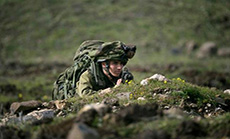The Resistance: The Golan Stage

Nahed Hattar - al-Akhbar newspaper
In 1981, in his response to the enemy's decision to join occupied Golan, late President Hafez al-Assad said it, firmly and concisely, "Golan Heights are not situated on Syria's border, but in its center."

Indeed, this water-abundant fertile sumptuous pinnacle is situated in the center of Greater Syria; The Heights overlook Tabariya Lake and Hula Valley in the Galilee from the West, and borders with the plains of Hauran through Rakkad Valley that ends in Yarmuk River, Ajloun in Jordan through the river, and Lebanon through the hills of Mount Hermon. These 1860 km2 constitute the region of the golden center in the Syrian land. And, it might, when occupation is brushed off, assume a key developmental role as a common water-rich economic zone, a summer heaven, and a station for transportation means that would cut short distances and unite communities.
For al-Assad, Greater Syria was the same aspired political Syria. And it's a paradox that the capacities to achieve this goal are available in the worst time. The first step to be realized here is unity within the Resistance in South Lebanon and the Golan, and always towards Palestine. Yet this unity entails what is more than support and coordination; it is the unity of the political path, the decision, and the center of the decision-making in Damascus.
Today, the Golan is a resisting region; on its soil, the stage of war ends outside the mini walls and resistance movements, and a new era of strategic comprehensive resistance begins for the purpose of liberating the land, the unity of Syria, and nationalist development. Doesn't this what the martyrdom of Hizbullah's members in Qoneitra signify?
The ongoing analysis is delving into the aggression and the response; is retaliation a priority or not? Will there be any response? And when? Will it develop into a regional war or will remain limited to the restrictions of the deterrence balance? This normal preoccupation is met by Syria and Hizbullah's terrifying silence, the out-and-out Iranian threat, and the Israeli panic embodied by the many embedded apologies to Tehran: "We did not mean the General."
All possibilities are available. The US is ready to pressure "Israel" to absorb a limited blow that would close the dossier; nonetheless, the parties of the Resistance axis, with their Russian ally, have nothing to fear in the event of a global war: Syria will assume a high cost, yet not higher than the one it has been paying since four years; besides, it shall render the regional climate favorable for it and shall drive the entire axis to fight with it, so that it ends up, with a quality leap, outside the crisis. And, if Hizbullah is ready, as stated by its Secretary General, then the war is definitely a date for political, strategic, and moral gains; as to the party's allies in Iran, the war will be a date not just to express an excess of power, but also to reach a simmering course to address all dossiers. Concerning Russia, a war that shall increase the price of the oil barrel to more than USD 100 and bolster Moscow's role is not a bad choice.
Sooner or later, the Resistance axis has no interest if the current status-quo continues. And, it is no secret that the front that is prone to break it is that of "Israel." Even though the incessant terrorist war against the Syrian state since 2011 is the war of imperialism and Arab fustiness aiming to demolish the last fief of sovereignty, development, and resistance in the Arab world, anybody with conscience and perspicacity wouldn't ignore that this war is also led in the name of "Israel." Today, in 2015, the scene of war is completely unearthed, whereas nobody can hide behind liberal, humanitarian, or sectarian mottos; today, trenches faded into merely two: whether with Syria or with "Israel;" "al-Qaeda-al-Nusra Front," after the "Free Syrian Army," discovered this, and implicated in an announced alliance with "Israel" in the Golan and the regional intelligence services enemy to Damascus perceived the importance of entrenched cooperation with Tel Aviv. In the North, ISIS is working, after all, for the account of Erdogan's Turkey who knows that realizing its regional greed in Syria is only doable through agreement with "Israel."
Response or no response? War or no war? Two questions, that are, albeit salient, secondary; in fact, the stringent question is the following: resistance or no resistance? And the answer is clear: the resistance is enhancing a path and a structure. Perhaps the stupidity that "Israel" has made is exactly represented in breaking the mutual silence over the future of the conflict in the Golan and the announcement of the starting moment; this is how we shall keep linking between the martyrs of January 18, 2015, and the official date for the beginning of the popular resistance in the Heights, which unifies the strategic, defensive, and developmental course of Greater Syria.
Comments




